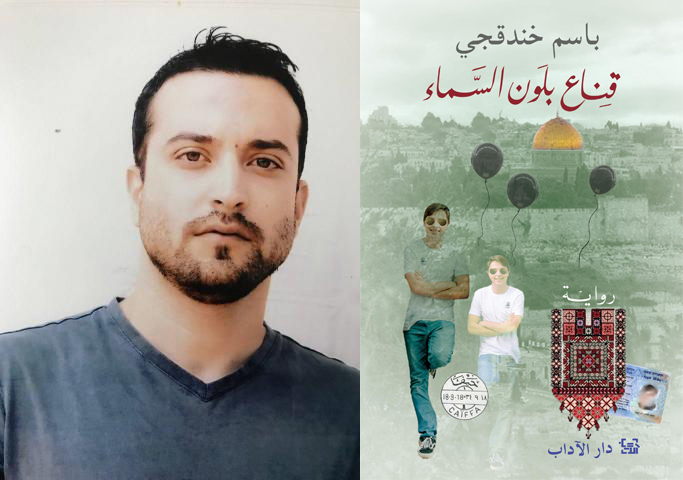Imprisoned Palestinian Author Basim Khandaqji’s Win Reignites Old Questions About Booker Prize Standards
Author Basim Khandaqji and his novel, “A Mask, the Color of the Sky” (Dar al-Adab, 2023).
It would be remiss to overlook the significance that this year’s chosen winner for the International Prize for Arabic Fiction (Booker), one of the Arab world’s most prestigious literary awards, was written by an imprisoned Palestinian writer. When the prize committee announced the victory of Basim Khandaqji’s “A Mask, the Color of the Sky” (Dar al-Adab, 2023) in April, six months after Israel’s attacks on Gaza began, media outlets were quick to recognize Khandaqji’s daunting feat of publishing from jail. Many critics revisit the prize’s decision as nearly a year since the beginning of the war approaches. This comes as Arab literary awards continue to suffer under accusations of favoritism and ambiguous judging guidelines.
Arab literary awards have built a reputation for their predictability. Dr. Muhammad Salim Shousha, in the website AboutMSR, points out an unspoken bias towards Palestinian writers and the topic of the Palestinian cause within prize deliberation committees, stating that even without reading any of the books or gauging their artistic level, one can predict the outcome of the award. Prison literature, in particular, has received much attention since the latter half of the 20th century. Basim Khandaqji’s awarding of the Booker Prize prompts deeper discussions of prison literature produced throughout the past 50 years, raising questions: did the novel’s emotional reception, given the tensions of the ongoing war, factor more into the deliberation process than its artistic merit?
Basim Khandaqji wrote “A Mask, the Color of the Sky” in prison, where he has been detained for 20 years since his arrest by Israeli authorities in 2004 on charges of terrorism. Born in 1983 in Nablus, he is serving three life sentences for his alleged involvement in a bombing at Tel Aviv’s Camel Market. Inside prison, he completed his studies at Al-Quds University and earned his degree in Political Science with a thesis on Israeli Studies. The International Prize for Arabic Fiction named his novel this year’s winner at a ceremony in Abu Dhabi. It announced funding for its English translation, marking the first time an imprisoned writer has won the Booker Prize. Rana Idriss, director of Dar al-Adab and the book's publisher, received the award on the author’s behalf while his brother Yousef Khandaqji sat in the crowd during the announcement.
Khandaqji has written numerous works throughout his 20 years of imprisonment, including two poetry collections and five novels. “A Mask, the Color of the Sky” marks his most recent book and follows the story of a Palestinian archaeologist named Nur who lives in a refugee camp in Ramallah. However, Nur’s life suddenly turns after he discovers a blue identity card in a coat pocket and adopts the identity of its owner, an Israeli citizen named Ur. Donning this new mask, he joins an archaeological research group and ventures on a journey that not only challenges his knowledge but also the inner turmoil between his true Palestinian identity and the Zionist mask he wears. As Ali al-Kafrawi describes in Al Jazeera, “The novel gives a glimpse of another dimension of the suffering of the Palestinian people away from the noise of bullets and the chants of the resistance.” Syrian writer Nabil Suleiman, the chair of the award’s judging committee, praises the novel for its “multilayered narrative” that “fuses the personal with the political in innovative ways. It ventures into experimenting with new narrative forms to explore three types of consciousness – that of the self, the other and the world,” as cited in The National.
Excerpted from Naomi Pham's “Literary Awards Determined by Craftsmanship or Politics? Imprisoned Palestinian Author Basim Khandaqji’s Win Reignites Old Questions About Booker Prize Standards,” which appeared in Al Jadid Magazine, Vol. 28, No. 85, 2024 and Inside Al Jadid Reports, No. 92, 2024.
Copyright © 2024 AL JADID MAGAZINE

